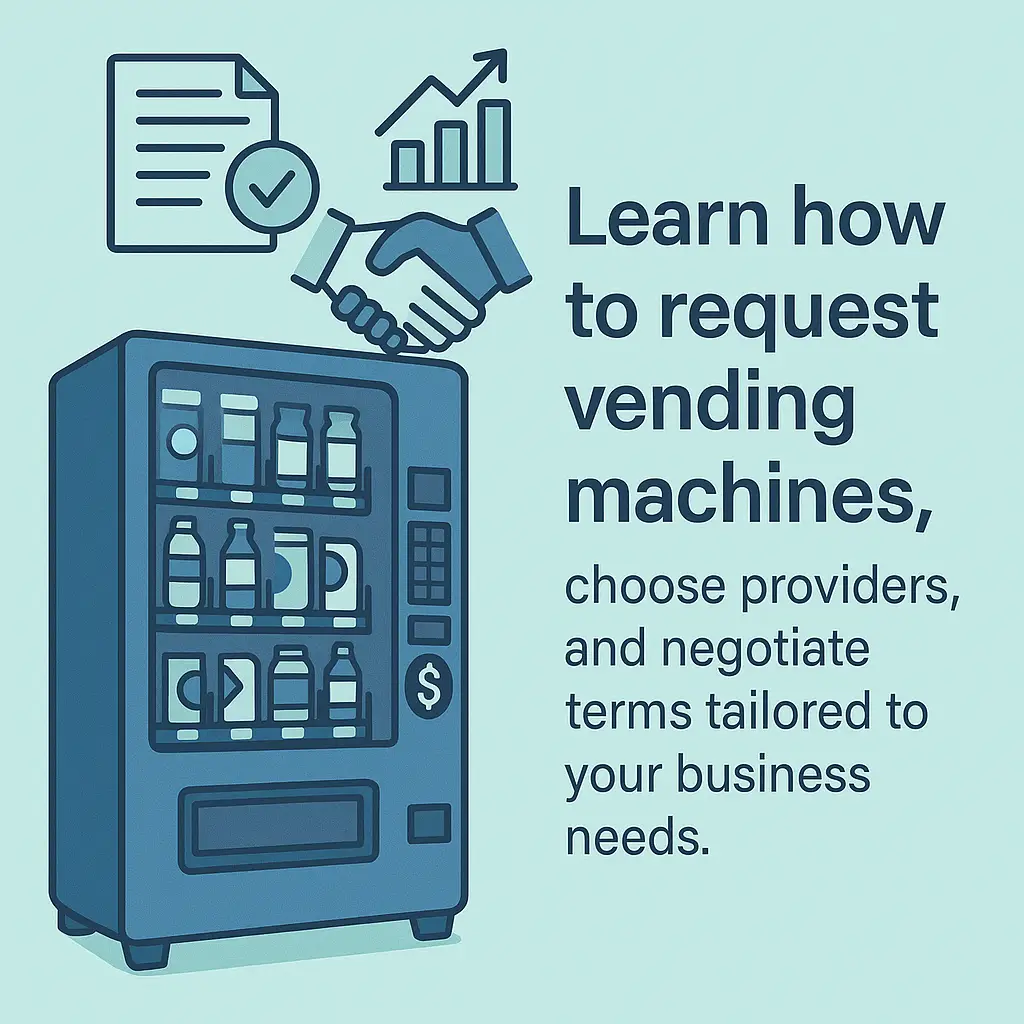How to Get a Vending Machine for Your Business
Learn how to request vending machines, choose providers, and negotiate terms tailored to your business needs.
Back to Vending Info for Businesses ResourcesLearn how to request vending machines, choose providers, and negotiate terms tailored to your business needs.
Back to Vending Info for Businesses ResourcesChoosing the right vending provider depends on your traffic volume, machine type preferences, and service expectations. Look for providers who offer responsive support, restocking schedules, and newer machines capable of cashless payments. Vending Exchange can simplify this process by matching you with vetted, local vendors.
![]() Start by assessing space, foot traffic, and dietary needs
Start by assessing space, foot traffic, and dietary needs
![]() Compare machine types like combo and micro market options
Compare machine types like combo and micro market options
![]() Smart vending tech offers better maintenance and payment options
Smart vending tech offers better maintenance and payment options

Setting up a vending machine for your business doesn’t have to be complicated. Whether you're managing an office, apartment complex, school, or healthcare facility, understanding the process helps avoid delays and ensures your provider fits your needs. Here’s a step-by-step breakdown to help you get started.
First, assess the space where you'd like a vending machine installed. Consider foot traffic, available wall space, and accessibility. Busy offices and communal areas benefit from combo machines or glass-front snack machines, while larger campuses might explore micro markets or even AI-powered coolers.
Next, decide what products matter most to your users—snacks, drinks, healthy items, or shelf-stable meals. This will influence the type of machine you need. For example, a micro market is ideal for offering multiple meal-sized items and fresh selections, while compact combo machines are space-efficient and versatile.
Choosing a vendor is crucial. Issues like expired products, broken machines, and poor service often arise from unreliable providers. It’s important to vet operators for responsiveness, restocking frequency, and machine maintenance. Many businesses prefer smart machines with contactless payment, remote monitoring, and inventory tracking—which also reduce downtime and boost user satisfaction.
Most trusted vendors provide everything—machine, delivery, installation, and servicing—at zero cost for qualifying sites. Clear communication about who handles maintenance, how often machines are stocked, and any product customization options helps set a strong foundation. Services like Vending Exchange simplify provider selection by matching businesses with qualified local vendors who meet their space and service requirements.
If you'd like to explore how vending works in different environments, check out the differences in school vending strategies by institution type or how healthier options are being integrated into hospitals.
If you're exploring vending options for your business, Vending Exchange can help simplify the process. Delivery, Installation and Equipment is provided at no cost to you - vendors provide the machines, keep them stocked, and handle all servicing. Whether you need a provider or full-service management, just fill out the form on this page to get started.
Start by identifying your needs and requesting a provider through a referral service like Vending Exchange. Installation is typically completed within 7 days if your location qualifies.
Most qualified businesses get machines installed, delivered, and maintained at no cost. You only pay for the items purchased from the machine.
Frequent issues include expired products, broken machines, inconsistent stocking, and poor customer service. Choosing a vetted local vendor helps avoid these problems.
Options include combo machines, glass-front drink machines, micro markets, and AI-powered smart coolers, depending on your space and user needs.
Yes, modern vending machines support contactless payments like credit cards, Apple Pay, and Google Wallet—making them more user-friendly.
Options range from snacks and energy drinks to healthy food items, bottled water, and even shelf-stable meal kits.
Restocking frequency varies by vendor and product demand. Most providers offer weekly or bi-weekly restocking schedules for busy locations.
Reputable vendors offer service contracts and remote monitoring to handle maintenance quickly when machines need repair.
In most commercial settings, no permit is needed. However, certain regions or building managers may require approval or building access arrangements.
Choose a responsive vendor, clarify service responsibilities upfront, and monitor machine performance regularly. Vending Exchange supports ongoing vendor management if needed.